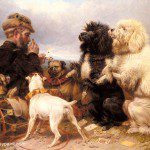Scripture does not have much good to say about dogs. In the Ancient Middle East dogs typically lived on the street, struggling for survival and eating at the dump. They became biblical symbols of filth and paganism.
When Jesus instructed his disciples not to give to dogs what is holy, he meant not to throw holy things out, his language suggesting that in everyday thinking dogs were synonymous with garbage. In the Old Testament dogs were “de facto undertakers” (Dictionary of Biblical Imagery) who licked the blood of corpses (think of Naboth, Ahab, Jeroboam, Baasha, and Jezebel).
Both Proverbs and Peter spoke of dogs returning to their vomit, likening them to unrepentant sinners (Prov 26:11; 2 Pet 2:22). “Dog” was the euphemism for male prostitutes in Deuteronomy and Revelation (Dt 23:18; Rev 22:15) because of the position taken in male intercourse. “Dog” was also used as an insult or term for extreme subservience (1 Sam 17:43; 2 Ki 8:13). Paul went so far as to refer to Judaizers—Jewish Jesus-followers who insisted that Gentiles had to become Jews in order to be first-class Christians—as dogs (Phil 3:2). Needless to say, it was not a compliment.
Martin Luther suggested that dogs were not esteemed because they were so common.
“The dog is the most faithful of animals and would be much esteemed were it not so common. Our Lord God has made his greatest gifts the commonest.”
But even if dogs were not highly valued in the biblical period, they have been appreciated by Christians ever since, not least by Luther. Like many other Christians in church history, Luther found that dogs could teach him about God and his son Jesus. Here is another word from the Reformer, this one in Table Talk, the record of his dinner conversations with students and guests.
“When Luther’s puppy happened to be at the table, looked for a morsel from his master, and watched with open mouth and motionless eyes, he [Luther] said, ‘Oh, if I could only pray the way this dog watches the meat! All his thoughts are concentrated on the piece of meat. Otherwise he has no thought, wish or hope.'”
Luther took his dog to be a lesson in single-minded prayer.
Tomorrow: dogs as theologians.












